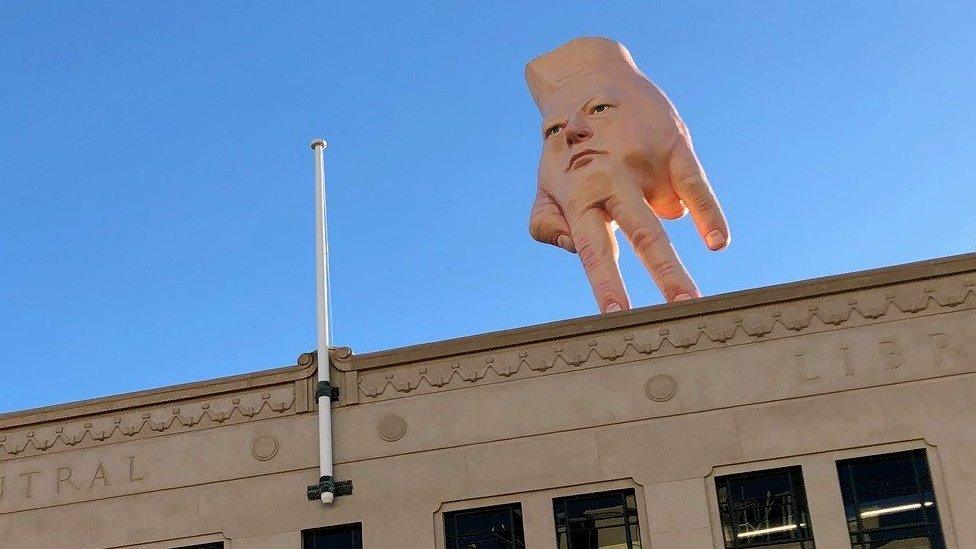'Nightmare' hand statue looms over New Zealand city
- Published

The newly-installed sculpture is the stuff of nightmares
A giant hand which has been described as a "Lovecraftian nightmare come to life" has been lifted into place atop Wellington's City Gallery in New Zealand.
Ronnie van Hout's "Quasi" installation was carried by helicopter to its new home on Monday overlooking the city's civic centre.
The artwork, which was created in 2016, . It is on loan to Wellington, where it will stand for the next three to four years.
The operation has cost NZ$74,000 (US$47,000; ÂŁ39,000), which includes transportation, designing the hoist, and "Wellington-proofing" the hand against the local elements, .
The relocation of the five-metre tall (16 feet) sculpture, which weighs 400kg (880 pounds), has stirred up a mixture of revulsion and civic pride in New Zealand's capital.
The giant hand will stare out across Wellington for at least three years
Some people hate it, but on the other hand...
One spectator told Newshub that the "Lovecraftian" sculpture left her . Early 20th century American writer HP Lovecraft was known for works of horror featuring nightmarish creatures, described as beyond the imaginations of mortal men.
Twitter users are comparing the face of the artwork to US president Donald Trump, and drawing analogies to Thing, the disembodied hand from The Addams Family.
But there's support for the hand as well. says one Twitter user welcoming the addition of challenging public art on the city skyline. "I love it, personally. The people who hate it are incredibly boring".
You may also be interested in:
The artwork is named Quasi after Quasimodo, the titular character in French author Victor Hugo's 1831 book The Hunchback of Notre Dame. Mr van Hout says the piece "it's a human form that's not quite human as well. The idea of something that resembles a human but is not quite human".
Wellington City Gallery's chief curator Robert Leonard told Stuff.nz that the piece is about how. Noting how the Parisian Quasimodo came to be loved by the people of the French capital, he said people would see through the piece's "loathsomeness, its disfigurement, [and] its hideousness and [decide it] almost asks to be loved".
However, residents of its previous home don't seem too sad to see the back of Quasi: many on Facebook comment.
The artist Ronnie van Hout is known for his thought-provoking and disturbing work
Reporting by Alistair Coleman
Next story: Crusader winery found under house in Israel
Use #NewsfromElsewhere to stay up-to-date with our reports via .